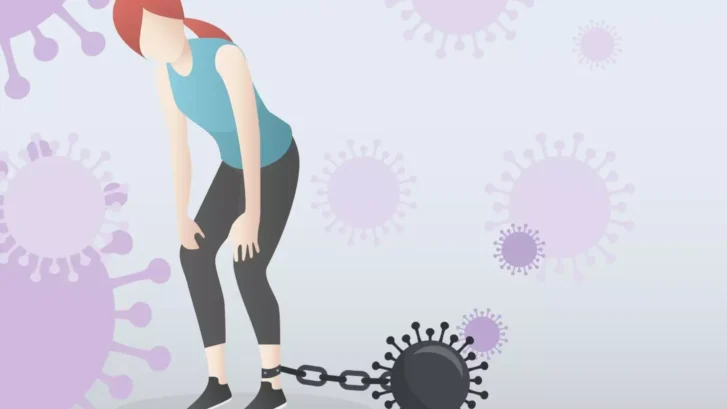Living with Long COVID
The post-COVID syndrome commonly known as “long COVID” or “long-haul COVID” can be debilitating.
Although not everyone experiences aftereffects from infection, some of the most common symptoms include lingering fatigue, shortness of breath after even mild exertion, trouble sleeping, “brain fog,” and symptoms that worsen after physical or mental activity. Others can include rapid heartbeat, chronic pain, dizziness, muscle weakness, and erectile dysfunction.
Adding to the mystery, long COVID affects those who have been hospitalized for the illness as well as those who had only mild symptoms, including children.
Our concierge doctors in Jupiter have been just as frustrated as those who are reporting such symptoms. While the medical community has acknowledged that people’s lingering symptoms are real, no one has been able to pinpoint a definite cause, let alone a cure.
Studies not encouraging
Unfortunately, the most recent studies don’t offer much hope for a quick answer. One study from the University of Michigan published last fall found that more than 40 percent of COVID-19 survivors experienced long-term effects.
Another, from the Centers for Disease Control and Prevention (CDC) last year, estimated that as many as a third of patients who were never sick enough to be hospitalized were still feeling the effects at least three weeks after diagnosis.
“COVID-19 can result in prolonged illness even among persons with milder outpatient illness, including young adults,” the study authors wrote.
The most recent one, published this month in the journal The Lancet, found that over half of patients still had at least one COVID-19 symptom two years after their initial infection. This was an improvement for some, though, because at the six-month point, more than 68 percent still had symptoms.
“[The results of this study are] similar to what we hear patients in the U.S. saying, that they’re still experiencing symptoms at two years out, particularly in that first spate of patients in the pandemic,” Kristine Erlandson, an associate professor of medicine and an infectious disease specialist at the University of Colorado, told CNN.
Research ongoing
Erlandson is recruiting participants for another study funded by the National Institutes of Health (NIH), called the Researching COVID to Enhance Recovery (RECOVER) Initiative. The RECOVER Initiative has launched multiple clinical trials to help understand long COVID, officially known as Post-Acute Sequelae of SARS-CoV-2 infection (PASC).
Given the number of people affected, some critics have said that the $1.15 billion initiative is too small.
Ezekiel Emmanuel, a University of Pennsylvania bioethicist who has coordinated with dozens of experts to issue recommendations on addressing long COVID, told the Washington Post that the latest research initiative is a “good step in the right direction . . . but it needs to be bigger and faster,” given the millions of people affected and their desperation for answers.
In April the White House announced a new effort to coordinate information across the federal government to:
- launch centers of excellence and promote evidence-based care models
- expand and strengthen long-COVID clinics, expanding on work already being done by the Department of Veterans Affairs (VA)
- promote provider education and clinical support
- make services and supports available for individuals experiencing long COVID
Effective treatments elusive
But while all this research and these various initiatives are underway, doctors and clinics are treating the syndrome as best as they can, which largely consists of addressing the various symptoms. This can mean physical therapy for those with shortness of breath or fatigue, and various pain medications for such symptoms as ongoing muscle aches, gastroenteritis, or insomnia.
One possible treatment involves the use of the antiviral drug Paxlovid by Pfizer. Although no clinical trials have confirmed that it helps long COVID patients, three new case studies released this month showed that two of the three patients who used Paxlovid after infection “feel their long COVID symptoms improved substantially,” Michael Peluso, lead researcher at the University of California, San Francisco, told Reuters.
Two other case studies published in The Journal for Nurse Practitioners in February found that two women who took over-the-counter (OTC) antihistamines (diphenhydramine) experienced “significant” relief from severe long COVID symptoms.
Another promising treatment may involve anti-inflammatory steroids.
“COVID affects multiple organ systems with inflammation,” lead researcher Arch Mainous, vice chair for research at the University of Florida Department of Community Health and Family Medicine, told Newsmax Health earlier this month.
“That’s why some people have cognitive problems, while others can’t smell and others have kidney problems or strokes,” he said. He stressed that his was simply an observational study that needed follow-up clinical trials.
“I’m not suggesting people be put on steroids or that they go home and down a bottle of Advil,” he said.
Prevention still best
We’re continuing to research the latest treatments for the syndrome, and will keep you apprised of new developments. But because we still know so little about long COVID and how to treat it, it’s important to avoid infection if you can.
This means continuing to wear high-quality masks (N95s are best) in indoor spaces, limiting train, bus, and air travel, and avoiding eating in indoor restaurants.
Vaccination is important, too, not only to limit the chances of becoming severely ill, but also of getting long COVID, because some early studies seem to show that those who are vaccinated have a lower chance of acquiring lingering aftereffects.

